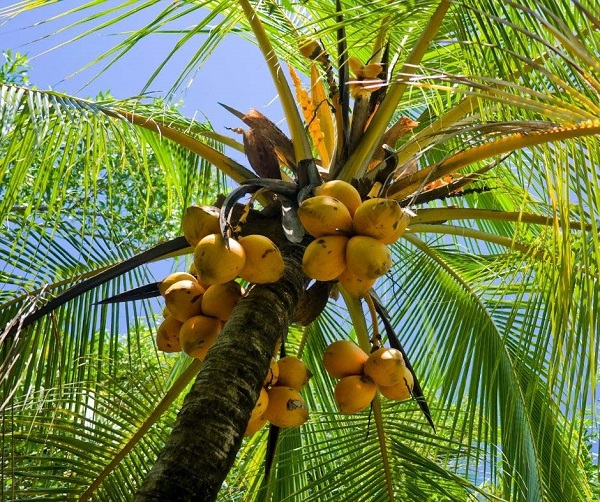
The coconut tree (Cocos nucifera) is a member of the Arecaceae family, produced in about 22 states in Nigeria. However, the main producing states are Lagos from where about 70 per cent of national output comes from, Akwa Ibom, Delta, Edo, Ekiti, Ogun, Ondo, Oyo, Rivers and Taraba. Despite the huge potentials, total local production can only meet about 20 per cent of national demand. As a result, the country has continued to import coconut in increasing quantities over the years. In 2019, more than 80 per cent of the national requirement was met through importation and the country expended $219,446.53 and $293,214.22 on coconut importation in 2019 and 2018, respectively. According to the Food and Agriculture Organization (FAO), the country ranks 19th position in global coconut production.
The global coconut products market size is expected to reach US$95.64billion by 2025, according to a new report by Grand View Research, Inc. It is anticipated to expand at a CAGR of 17.8 per cent during the forecast period. In 2019, Indonesia was the largest exporter of coconut in the world, followed by Thailand and Viet Nam. The three countries held about 23 per cent share of total exports while Cote d’Ivoire, Malaysia, the Netherlands, Mexico, Guyana and India, all made up 17 per cent of the total export.
Speaking to Science Nigeria, a chartered chemist, Dr. Moses Omojola, said there are more than 40 various direct products and by-products of coconut entering the international markets. Among these, coconut water has gained popularity as a result of its health benefits.
He said coconut water is the leading plant-based water available for sale worldwide. It reduces the risk of heart disease, boosts kidney health, possesses cardioprotective effects, aids in maintaining blood pressure levels and in diabetes management. Also, the growing preference toward healthier dairy milk alternatives and naturalness is increasing the demand for coconut milk which is a high-calorie food. About 93 per cent of its calories come from fat, including medium-chain triglycerides (MCTs). MCT fats in coconut milk help with weight loss.
Coconut oil has positive impacts on people suffering from Alzheimer’s disease as it reduces the cognitive deficiencies related to the disorder.
“It increases high-density lipoproteins (HDL) levels, thereby, reduces the risk of heart diseases. The demand for virgin coconut oil (VCO) is growing faster due to the rising use of healthier vegetable oils and the increasing application of VCO in food supplements and premium healthy snacks. According to the market analysis by the U.S. Department of Agriculture (USDA), the industrial consumption of coconut oil in the cosmetic and skincare industry increased from 1.51 million metric tons in 2018 to 1.79 million metric tons in 2019. The growing awareness of coconut oil’s anti-ageing properties led to the significant increase in the demand across the beauty and skincare industry,” he added.
Speaking on potentials available in Nigeria for coconut, the director-general of the Raw Materials Research and Development Council, Prof. Hussaini Ibrahim, said the Federal Government has identified coconut as one of the seven critical cash crops in the country.
According to him, the main constraint of the coconut sub-sector is low production attributable to low productivity and low expansion and rehabilitation of the area under coconut production.
He identified the key factors responsible for the low productivity of this wonder crop to include poor coconut husbandry practices, the effect of drought stress, poor soil fertility, incidence and severity of pests and diseases estimated to have killed more than eight million palms.
“Other factors are the old age of coconut trees and the predominant planting of low yielding coconut varieties. Another major factor limiting coconut production is the dependence on importation of coconut seedlings from Malaysia and the neighbouring West African countries as the local coconut variety, the Guinea tall variety, cannot compete in terms of yield and the time of commencement of fruiting with the dwarf varieties. The tall, local Guinea variety starts fruiting between 9 -15 years while the imported dwarf variety commences fruiting between 3 to 4 years,” he said.

The RMRDC boss revealed that the council initiated a techno-economic survey in 1987, which highlighted the untapped potentials of many tree crops following which the Council in May 1994 organised the first-ever investors’ forum themed “Coconut as an Industrial Crop and Raw Materials” in collaboration with Lagos State government.
He said the forum recommended the need for a clear policy on coconut development in Nigeria and also, the establishment of a Coconut Development Agency in Lagos State.
“It further recommended the gradual but phased replanting of the old coconut trees in Nigeria with improved dwarf coconut varieties. The recommendations led to the establishment of the Lagos State Coconut Development Committee in 1995 and the conduct of a benchmark survey on coconut production in Lagos State in August 1995. The report of the benchmark survey indicated that although, Lagos State was the largest producer of coconut in Nigeria, the bulk of coconut production came from six local government areas, namely Badagry 50 per cent, Ojo 40 per cent, Eti-Osa 3 per cent, Ibeju-Lekki 3 per cent, Epe 2 per cent and Ikorodu 2 per cent,” he highlighted.
Ibrahim averred that following the success achieved with the first investors’ forum, a second investors’ forum on coconut was organised to harmonise the pathway to coconut and coconut value chain development in Nigeria, adding that the 2nd forum was organised in 2002 by RMRDC and the Lagos State Coconut Development Authority, LASCODA. The event succeeded in highlighting the prospects and challenges facing the coconut sub-sector and it put in proper perspective, developmental issues about coconut and agriculture in general.
“In recognition of the tremendous contribution of the council to coconut development in Nigeria, the Lagos State government called on the expertise of the council as chairman of the organising committee to midwife the hosting of the first international coconut summit in Lagos State in October 2019. The summit with the theme “Unlocking the Industrial and Socio-Economic Potentials of Coconut” drew local and international investors. The highlight of this event was the presentation of 3000 improved seedlings of coconut developed by NIFOR under the auspices of RMRDC to each of the 57 local governments and LCDAs in Lagos. The communiqué of the International Coconut Summit recommended the need for more improved seedlings for farmers,” he stated.
According to him, thus, the RMRDC commissioned the production of another 5000 improved coconut seedlings by NIFOR for distribution to farmers all over the country through the National Coconut Producers, Processors and Marketers Association of Nigeria (NACOPPMAN) at a special occasion to commemorate the World Coconut Day at NACOPPMAN Headquarters Abuja in September 2019.
The RMRDC helmsman added that these improved coconut seedlings formed the basis for the renewed hope to enhance coconut production and create more resource-based manufacturing industries in the country. Likewise, the Council was among the major organizers of the 1st National Coconut Conference and Expo in September 2021 themed “COSIN: Towards Sustainable Economic Development in Nigeria”. The event, which coincides with World Coconut Day, was held at the Nigeria Export Promotion Council from Thursday 2 to Friday 3 September 2021.
He pointed out that the conference aimed at creating awareness of the enormous benefits of coconut as a cash crop and its impact on Nigeria’s economic development by promoting coconut and associated processes across the value chain, to create jobs and wealth through economic diversification, medicinal and nutritional provisions and to improve the well-being of Nigerians.
“Nigeria emerged the preferred investment destination on coconut development at the 2nd World Coconut Congress in Manila, Philippines, in August 2019 after its potential was enumerated. The business session that had multinational coconut processing firms in attendance organized visits to Nigeria in September 2020 and in October 2020, participated at the International Coconut Summit at the Airport Hotel, Ikeja, Lagos. The mission, which comprised of members from South Korea, Philippines, Malaysia and India and led by Mr Jeff King, the president of CNIT from South Korea, held business meetings with manufacturers in the food and beverages sector in MAN House, Ikeja, Lagos and at RMRDC Corporate Headquarters in Abuja.
“A follow-up meeting in South Korea in January 2021 culminated in the signing of a memorandum of understanding (MOU) on coconut plantation development, coconut processing and engineering designs and fabrication. The MoU also included a manpower exchange and training programme on engineering designs and processing equipment/production at the CNIT factories in South Korea.
“It is hoped that if all coconut development issues are adequately harmonised and efforts at developing coconut value chain locally are sustained, Nigeria will, within the next few years, be a major force to reckon with as a major player in coconut production and processing globally. The country would be able to generate more than N20 billion in foreign exchange equivalent through coconut and its derivatives export,” he added.


